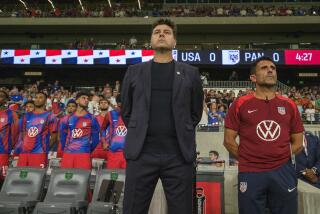WORLD CUP USA ’94 / THE FIRST ROUND : COMMENTARY : Referee Sets Tone--and It’s Not a High Note
- Share via
CHICAGO — Well, the tone has been set for officiating in the World Cup, and it’s not a pretty picture.
Arturo Brizio Carter, a 36-year-old lawyer from Mexico had the honor to be assigned to referee the Germany-Bolivia match at Soldier Field Friday, but he turned in a feeble performance that could have an impact on the rest of the monthlong tournament.
But it wasn’t all Carter’s fault. He was under strict instructions from FIFA, world soccer’s governing body, to give the benefit of all doubt to the offensive players.
The result?
--A German goal that had Bolivia’s coach, Xavier Azkargorta, screaming offside.
--The expulsion of Bolivia’s star player, Marco Etcheverry, for a foul that goes unpunished nine times out of 10.
--Six yellow cards, four of them against the Bolivians, which further jeopardizes their chances of reaching the second round.
Not a bad afternoon’s work.
The referee for the opening game always is chosen with care because he sets the tone for the tournament and more or less acts as a guide for the other referees to follow.
Carter has a good reputation, and if it turns out that FIFA praises his performance--there was no immediate reaction Friday--it means this World Cup will surpass even Italia ’90 in its distribution of yellow and red cards.
“I thought the referee was a bit too strict,” Eddie Thompson, Australia’s national team coach, said after the game. “I think one or two of the bookings (yellow cards) were deserved, but. . . .”
Coaches and players were warned before the tournament that referees would do all they can to protect skilled players from the more unkind attention of defenders. Tackles from behind, for instance, are supposed to result in an automatic red card.
Thompson, who is working at the World Cup for FIFA’s technical committee, said consistency of decisions is the key to controlling games. If players know exactly what will be tolerated, they can adjust their game accordingly. But if referees interpret the rules in different ways, chaos results. “As long as (the World Cup referees) all keep doing the same,” he said, “I won’t complain.”
Bolivia might be doing a little complaining, though. Etcheverry and Erwin Sanchez are its most skilled players, the key to its World Cup hopes. But Sanchez was felled time and again by the German defenders and at one point was carried off on a stretcher, only to return moments later.
As for Etcheverry’s expulsion, it came because he lifted his leg as if to kick German captain Lothar Matthaeus after the two had tussled for the ball. Etcheverry all but admitted kicking Matthaeus.
“All I can say is I’m sorry,” he said. “I can’t say whether I did it or not. I think it will be very clear (on television replays) that I did it. But for me the most important thing to me is to apologize to the public because they were waiting for a good show and today I failed.”
As a game, the Germany-Bolivia opener seldom reached great heights. There were incidents that made it interesting, but too little skill or drama to make it memorable.
The heat was possibly to blame, but opening games have a patchwork history. Some have been tremendous, others simply tedious.
In the very first World Cup game, for instance, Mexico lost to France, 4-1, at Montevideo, Uruguay. France’s Lucien Laurent scored the first World Cup goal, but teammate Alex Villaplane would go into the history books for an altogether less honorable reason. Years later, he was executed by a firing squad for collaborating with the Germans in World War II.
The United States once took part in an opener, although the result is one that Americans would rather ignore. A 7-1 defeat by Italy in Rome in 1934 in front of Benito Mussolini is perhaps best forgotten. Aldo (Buff) Donelli, who later made his name as Columbia’s football coach, scored the lone U.S. goal.
There have been memorable moments from other opening games too.
In 1938, the Swiss team refused to give the Nazi salute during the German national anthem at the opening game in Paris. In 1950, Brazil beat Mexico, 4-0, in the World Cup debut of Antonio Carbajal, the Mexican goalkeeper who would become the only player to compete in five World Cup tournaments. Carbajal was also in the nets for Mexico in the opening game of the 1958 tournament in Sweden. His luck was no better as Mexico lost to Sweden, 3-0, at Stockholm.
There was once a stretch of two decades when no goal was scored in the opening game. The World Cup openers of 1966 in England, 1970 in Mexico, 1974 in West Germany and 1978 in Argentina all ended 0-0.
The 20-year dry spell ended with an upset when Belgium defeated Argentina, 1-0, at Barcelona, Spain, in 1982 in Diego Maradona’s World Cup debut.
Four years ago, Argentina was again the defending champion and again lost the opener, this time to Cameroon at Milan.
That opener saw two Cameroon players red-carded, and yet the African team still reached the quarterfinals.
If it is any consolation to the Bolivians, perhaps they will be as fortunate in this tournament.
More to Read
Go beyond the scoreboard
Get the latest on L.A.'s teams in the daily Sports Report newsletter.
You may occasionally receive promotional content from the Los Angeles Times.







